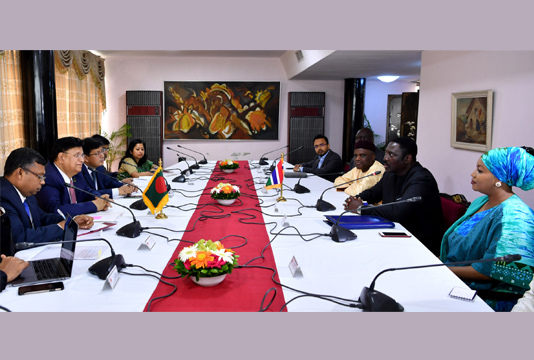“Gambia has taken a lead on the Rohingya issue. The country will take the Rohingya issue to the international court of justice (ICJ) for the accountability of the persecution of Rohingya people, unleashed by the
He came up with the statement before the journalists after signing a Protocol on Bilateral Consultations between foreign ministries of Bangladesh and Gambia by the two Foreign Ministers at the State Guest House Meghna.
Momen said, “We are satisfied and grateful to
In reply to a query about the trial of Myanmar over the atrocities, Momen said, “We believe that justice should prevail. If anybody involved in criminal activity, the person should be punished.
The Rohingya people have been persecuted. We are pleased that
Mamadou Tangara is visiting Dhaka as the Special Envoy of the President of Gambia, Adama Barrow. The Gambian delegation also comprises the High Commissioner of Gambia in New Delhi and other high officials of the Gambian government.
At the outset of the meeting, Dr. Momen welcomed the Gambian delegation to Bangladesh. He thanked the Gambian government for their leadership role in the Organisation of Islamic Countries (OIC) on the accountability of issue related to the displaced Rohingyas.
He briefed the Gambian Foreign Minister about the gravity of the crisis that Bangladesh is facing with the displaced Rohingyas.
He urged for the necessity of creation of
He added that the accountability on the Rohingya issue must be determined and Bangladesh will support all OIC initiatives in this respect.
Dr. Momen also briefed the Gambian delegation about Bangladesh’s development march.
He informed the delegation that Bangladesh is among the most rapidly growing economies in the world it is expected that the economic growth will exceed 8 percent in the next fiscal year.
Momen suggested to the
He mentioned that cooperation may be established in agriculture and food production sectors with
He mentioned that Gambian investors may invest in Bangladesh and cooperation may be established in Energy, agro-processing and SME sectors.
He informed that
Asked about a query, Momen said, “
Asked about the signing of the agreement, Momen said, “It’s an agreement on bilateral cooperation on varieties of issues including business, trade, investment, political issues, multilateral issues. We have been working on different multilateral international forums like
UN and OIC.”
OIC leaders in March unanimously decided to move the ICJ against Myanmar for crimes against the Rohingyas in
Led by The Gambia, a 10-member high-powered ministerial committee adopted the resolution.
The committee’s first meeting was held in Banjul, capital of The Gambia, on February 10.
The resolution for a legal recourse through the ICJ came after a long negotiation to seek accountability for crimes against humanity and gross violation of human rights in the case of the Rohingyas in Myanmar. – Staff Reporter




